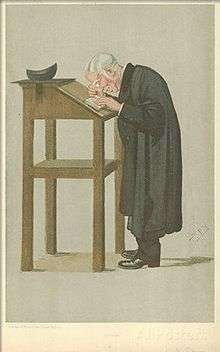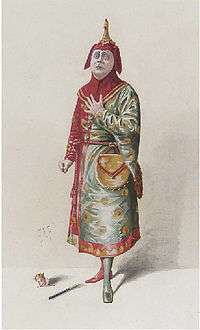Spoonerism
A spoonerism is an error in speech in which corresponding consonants, vowels, or morphemes are switched (see metathesis) between two words in a phrase.[1][2] These are named after the Oxford don and ordained minister William Archibald Spooner, who reputedly did this.
An example is saying "The Lord is a shoving leopard" instead of "The Lord is a loving shepherd." While spoonerisms are commonly heard as slips of the tongue, and getting one's words in a tangle, they can also be used intentionally as a play on words.
Etymology

Spoonerisms are named after the Reverend William Archibald Spooner (1844–1930), Warden of New College, Oxford, who was notoriously prone to this mistake.[3][4] The term "Spoonerism" was well established by 1921. An article in The Times from that year reports that,
The boys of Aldro School, Eastbourne, ... have been set the following task for the holidays: Discover and write down something about: The Old Lady of Threadneedle-street, a Spoonerism, a Busman's Holiday...[5]
An article in the Daily Herald in 1928 reported Spoonerisms to be a 'legend'. A Mr. Robert Seton, once a student of Dr. Spooner, admitted that the Dr.
made, to my knowledge, only one "Spoonerism" in his life, in 1879, when he stood in the pulpit and announced the hymn: 'Kinkering Kongs their Titles Take'...Later, a friend and myself brought out a book of "spoonerisms"'[6]
In 1937, The Times quoted a detective describing a man as "a bricklabourer's layer" and used "Police Court Spoonerism" as the headline.[7] A spoonerism is also known as a marrowsky, purportedly after a Polish count who suffered from the same impediment.[8]
Examples

The caption reads, "Through every passion raging."
The accompanying biography reads, "The only part of him which gets tired is his tongue, and occasionally the oft-repeated lines have got muddled. 'Self-constricted ruddles', 'his striggles were terruffic', and 'deloberately rib me' are a few of the spoonerisms he has perpetrated. Success has not spoilt him. He is a professional humourist, who has been known to make an Englishman laugh at breakfast."
Most of the quotations attributed to Spooner are apocryphal; The Oxford Dictionary of Quotations (3rd edition, 1979) lists only one substantiated spoonerism: "The weight of rages will press hard upon the employer" (instead of "rate of wages"). Spooner himself claimed[3] that "The Kinquering Congs Their Titles Take" (in reference to a hymn)[9] was his sole spoonerism. Most spoonerisms were probably never uttered by William Spooner himself but rather made up by colleagues and students as a pastime.[10] Richard Lederer, calling "Kinkering Kongs their Titles Take" (with an alternative spelling) one of the "few" authenticated Spoonerisms, dates it to 1879, and he gives nine examples "attributed to Spooner, most of them spuriously."[11] They are as follows:
- "Three cheers for our queer old dean!" (rather than "dear old queen," which is a reference to Queen Victoria)[11]
- "Is it kisstomary to cuss the bride?" (as opposed to "customary to kiss")[11]
- "The Lord is a shoving leopard." (instead of "a loving shepherd")[11]
- "A blushing crow." ("crushing blow")[11]
- "A well-boiled icicle" ("well-oiled bicycle")[11]
- "You were fighting a liar in the quadrangle." ("lighting a fire")[11]
- "Is the bean dizzy?" ("Dean busy")[11]
- "Someone is occupewing my pie. Please sew me to another sheet." ("Someone is occupying my pew. Please show me to another seat.")[11]
- "You have hissed all my mystery lectures. You have tasted a whole worm. Please leave Oxford on the next town drain." ("You have missed all my history lectures. You have wasted a whole term. Please leave Oxford on the next down train.")[11]
A newspaper column[4] attributes this additional example to Spooner: "A nosey little cook." (as opposed to a "cosy little nook").
Popular use
In modern terms, "spoonerism" generally refers to any changing of sounds in this manner.
- On the TV series Hee Haw, comedian/writer Archie Campbell was well known for using spoonerisms in his skits, most famously the "Pee Little Thrigs" and "Rindercella" skits, as well as previously doing so in his own comedy recordings well before the country/western-themed TV variety series, such as his "Beeping Sleauty" sketch.[12]
- The Washington, D.C. political comedy sketch group Capitol Steps[13] has a long-standing tradition of performing a routine called "Lirty Dies"[14] during every performance, which features a typically 10-minute-long barrage of rapid-fire topical spoonerisms. A few examples over the years range from "Resident Pagan" (President Reagan) and the US's periodic practice of "Licking their Peaders" (Picking their leaders) to the NSA "poopin' on Snutin" (Snoopin' on Putin) and "phugging everybody's bones" (bugging everybody's phones).
- Comedienne Jane Ace was notorious for her spoonerisms and other similar plays on words during her run as star of the radio sitcom Easy Aces.[15]
Poetry
Shel Silverstein's book Runny Babbit is almost completely written in spoonerisms, from character names to anything else.
In his poem "Translation," Brian P. Cleary describes a boy named Alex who speaks in spoonerisms (like "shook a tower" instead of "took a shower"). Humorously, Cleary leaves the poem's final spoonerism up to the reader when he says,
He once proclaimed, "Hey, belly jeans"
When he found a stash of jelly beans.
But when he says he pepped in stewWe'll tell him he should wipe his shoe.[16]
In Samuil Marshak's poem What an Absent-Minded Guy (Вот какой рассеянный), the titular character uses spoonerisms at one point ("Глубокоуважаемый Вагоноуважатый! Вагоноуважаемый Глубокоуважатый!"). The character is based on the Russian scientist Ivan Kablukov, who was prone to spoonerisms himself.
Twisted tales
Comedian F. Chase Taylor was the star of the 1930s radio program Stoopnagle and Budd, in which his character, Colonel Stoopnagle, used spoonerisms. In 1945, he published a book, My Tale Is Twisted, consisting of 44 "spoonerised" versions of well-known children's stories. Subtitled "Wart Pun: Aysop's Feebles" and "Tart Pooh: Tairy and Other Fales," these included such tales as "Beeping Sleauty" for "Sleeping Beauty." The book was republished in 2001 by Stone and Scott Publishers as Stoopnagle's Tale is Twisted.[17]
Music
- The title of the Van der Graaf Generator's album Pawn Hearts resulted from a spoonerism by David Jackson, who said one time: "I'll go down to the studio and dub on some more porn hearts", meaning to say 'horn parts'.[18]
- The title of Caravan's album "Cunning Stunts" is a spoonerism created by the band in the same vein as the titles of their two previous albums, "If I Could Do It All Over Again, I'd Do It All Over You" and "For Girls Who Grow Plump in the Night".
Folk etymology
A spoonerism is sometimes used in folk etymology. For example, according to linguist Ghil'ad Zuckermann, some laymen wrongly believe that the English word butterfly derives from flutter by.[19]:p.78
Kniferisms and forkerisms
As complements to spoonerism, Douglas Hofstadter used the nonce words kniferism and forkerism to refer to changing, respectively, the vowels or the final consonants of two syllables, giving them a new meaning.[20] Examples of so-called kniferisms include a British television newsreader once referring to the police at a crime scene removing a 'hypodeemic nerdle'; a television announcer once saying that "All the world was thrilled by the marriage of the Duck and Doochess of Windsor";[21] and during a live broadcast in 1931, radio presenter Harry von Zell accidentally mispronouncing US President Herbert Hoover's name as "Hoobert Heever."[21][22] Usage of these new terms has been limited; many sources count any syllable exchange as a spoonerism, regardless of location.[23]
See also
- Blooper
- Crash blossom
- Freudian slip
- Malapropism
- Metathesis
- Mondegreen
- Opperlandse taal- & letterkunde
- Parody
- Phonemic paraphasia
- Phonetic reversal
- Portmanteau words
- Sananmuunnos
- Smart Feller Fart Smeller: And Other Spoonerisms (book)
- Bushism
References
- Eric Donald Hirsch; Joseph F. Kett; James S. Trefil (2002). The New dictionary of cultural literacy. Houghton Mifflin Harcourt. p. 160–. ISBN 978-0-618-22647-4. Retrieved 20 May 2013.
- The definition of Spoonerism in the 1924 edition of the Oxford English Dictionary is: An accidental transposition of the initial sounds, or other parts, of two or more words.
- "Names make news". Time. 29 October 1928. Retrieved 20 September 2008.
- "Spoonerism Message Lost in Translation". Toledo Blade. 3 November 1980.
- "Every Schoolboy Knows", The Times, Dec 8, 1921, pg. 7
- '"Spoonerisms" a Legend' in Daily Herald 28/9/1928
- The Times, 29 October 1937, pg. 9
- Chambers Dictionary 1993 ISBN 0-550-10255-8
- Bartlett, John (1992) [1855]. Justin Kaplan (ed.). Bartlett's Familiar Quotations (16th ed.). Little, Brown and Company. pp. 533. ISBN 0-316-08277-5.
- Quinion, Michael (28 July 2007). "Spoonerism". World Wide Words. Retrieved 19 September 2008.
- Lederer, Richard (1988). Get Thee to a Punnery. Charleston, South Carolina: Wyrick & Co. pp. 137–148.
- MusicProf78 (26 January 2012). "1965 comedy: Beeping Sleauty - Archie Campbell" – via YouTube.
- "The Capitol Steps – We put the MOCK in Democracy". capsteps.com.
- "Capitol Steps – Lirty Dies !". capsteps.com.
- Sterling, Christopher H., ed. (2003). Encyclopedia of Radio 3-Volume Set. Routledge. p. 1696. ISBN 1-57958-249-4. Retrieved 1 March 2011.
- Cleary, Brian P. Rainbow Soup: Adventures in Poetry. Minneapolis, MN: Carolrhoda, 2004.
- "Stoopnagle's Tale is Twisted, by Ken James". Archived from the original on 6 October 2008. Retrieved 3 November 2008.
- Christopulos, J., and Smart, P.: Van der Graaf Generator – The Book, page 128. Phil and Jim publishers, 2005.
- Zuckermann, Ghil'ad (2003), Language Contact and Lexical Enrichment in Israeli Hebrew. Palgrave Macmillan. ISBN 9781403917232 / ISBN 9781403938695
- Hofstadter, Douglas (1995). Fluid Concepts and Creative Analogies: Computer Models of the Fundamental Mechanisms of Human Thought. NY: Basic. p. 117.
- Simonini, R. C. (December 1956). "Phonemic and Analogic Lapses in Radio and Television Speech". American Speech. Duke University Press. 31 (4): 252–263. doi:10.2307/453412. JSTOR 453412.
- "snopes.com: Harry von Zell and Hoobert Heever". Retrieved 2 February 2009.
- "spoonerism definition". Dictionary.com. Retrieved 2 February 2009.